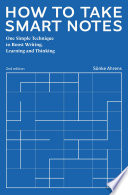
How to Take Smart Notes
“One cannot think without writing” - Niklas Luhmann
Introduction:
- There is no correlation between Academic success and IQ. (Once you have the basic requirement > 120)
- Main indicator for success is self-discipline and control over how to approach tasks. (Duckworth 2005)
Willpower
- Discipline is hard because willpower is finite.
- Instead of increasing willpower, create a situation where you don’t have to use willpower. You do this by making the process of writing / note taking rewarding.
Chapter 1: Everything you need to know
Qualities of a good note-taking workflow
- Is effortless and immersive.
- Allows you to switch between tasks without threatening to lose overall structure or motivation.
- Relieves the working memory by letting you offload information
- Lets you retrieve information instantly when you need it.
Good students wrestle with sentences because they care about finding the right expression.
I only do what is easy. I only write when I immediately know how to do it. If I falter for a moment, I put the matter aside and do something else.
Chapter 2: Writing a paper Step-by-Step
Fleeting notes
- Ideas, thoughts or plans. These are expendable.
Literature notes
- Ideas worth remembering.
- Written in your own words.
- Maintain a bibliography of the literature.
Permanent notes
- Go through slip box at least once a day.
- Rule of thumb: one note per idea.
- See how notes relate to your previous work.
- Don’t just collect ideas.
- Collect arguments, contradictions, questions.
- Do the notes generate new ideas? Can you combine different ideas?
Chapter 5: Writing is the only thing that Matters
- You don’t select a question and start answering a paper. You don’t start writing a paper from scratch.
Studying does not prepare students for independent research. It is independent research.
- If done properly, studying IS research.
If writing is the medium of research and studying is noting else than research, then there is no reason not to work as if nothing else counts than writing.
- Doesn’t mean all you do is right. What it means is that you understand the material and draw the essense because you can’t write everything down and if you wanna summarise, you gotta have deep understanding. This deep understanding helps you extend upon what you’ve written, enabling you to ask questions - research about - make permanent notes and repeat the cycle.
Chapter 6: Simplicity is Paramount
Common mistakes
- Not having a filter or buffer, writing everything down.
- Discarding information or not digging deeper after a project is over. Without a permanent reservoir - you limit yourself from long term - deeper projects.
- Run a tight ship - even small amounts of unclear knowledge can induce the wish to start from scratch.
- Underlining quotes or clipping texts are just equivalent to fleeting notes. Then become useless after at the most 2 days. Projec-Related notes: These might be todo listst, plans, drafts etc and can be separated form the slip-box.
Chapter 7: Nobody ever starts from scratch
Read with a pen in hand. Focus on what is interesting and keep track of your intellectual development. If you set a research question and answer it through the course of writing/developing it, you face the fundamental problem at the core of discovering something - knowledge or research isn’t linear. Therefore, you will break the narrative whenever you learn something too late. On the other hand, you can focus on questions or ideas that your notes cluster around. If it isn’t interesting, simply move on to another cluster.
You can’t force insight into a preconceived direction anyway.